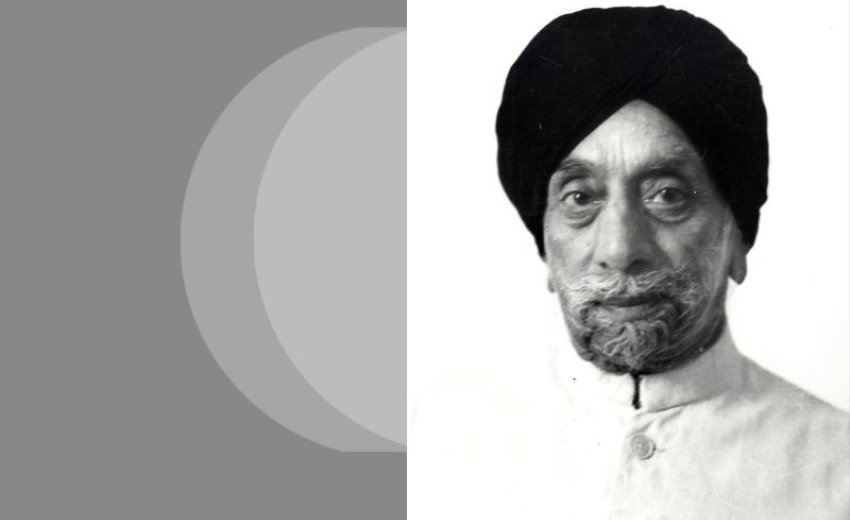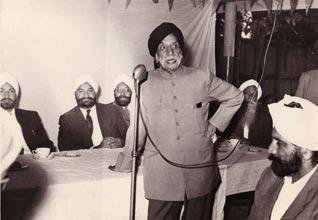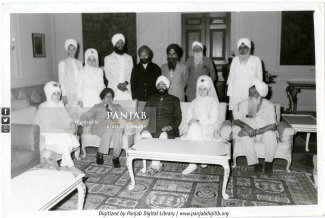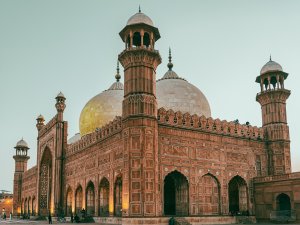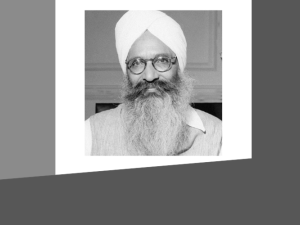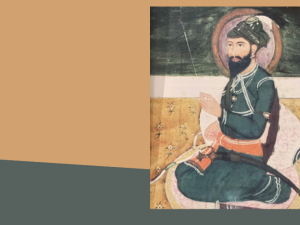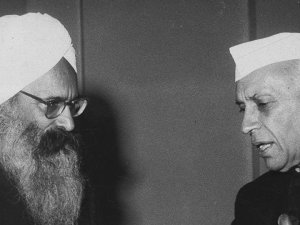S. Hukam Singh was the first Sikh who attained the top constitutional post in free India. He was born in 1895 in Montgomery (now in Pakistan). He was at the top of the Muslim rioters list at the time of partition. His life was at risk and he was evacuated by an Army officer of the Boundary Force disguised in Khaki uniform to Firozpur Cant. Penny-less, he traced his family members to a refugee camp after several days.
He was the Akali member in the Constituent Assembly which drafted the Constitution of India. He stubbornly fought for the protection of the rights of the minorities. Failing to get protection for the Sikhs as a religious Minority, he refused to put his signature as a Member of the new Constitution. The other Akali Member S. Bhupinder Singh Mann also followed him. This daring act on his part has given him a permanent panthic position in the Sikh community. Whenever the Sikh leadership raises the issue of Congress high command commitments to the Sikhs before Independence, they always remind the people that as a protest their representatives in the Parliament did not sign the new Constitution.
S. Hukam Singh was elected a member of Lok Sabha on the Akali ticket in 1952 from Bhatinda Constituency. He organized The National Democratic Front of which Dr. Shyama Prasad Mookerjee (founder of Jan Sangh) was the President and he was the Secretary. On the question of the reorganization of the States on linguistic basis, he fought for the creation of Punjabi Suba. He actively participated in all debates and was nominated to the panel of Chairman. He was again elected to Lok Sabha in 1957. Due to his popularity as a Member of Parliament, he was unanimously elected as Deputy Speaker. He earned the confidence of the members in his ability to run the House in an efficient and impartial manner. He was reelected Member of Parliament in 1962 from Patiala Constituency.
S. Hukam Singh got the historic distinction when he was unanimously elected the Speaker of the Parliament at the time when Pandit Jawahar Lal Nehru was the Prime Minister. In this five years term, India witnessed three successive Prime Ministers. On the death of Pandit Nehru in May 1964, Sh. Lal Bahadur Shastri succeeded him but due to his death in Tashkant, Indira Gandhi became Prime Minister in January 1966. In the Parliamentary history, S. Hukam Singh had the unique distinction of working with three Prime Ministers. He was later appointed Governor of Rajasthan.
He started his career as an Advocate in Montgomery. As a devout Sikh, he remained very active in organizations of the Sikh Community. He was President of the local Gurdwara and later on he took part in the Akali movement and had to go to Jail many times. He was elected as Member SGPC at the first election in 1925 and continued to be elected successively for many years.
Giani Kartar Singh was responsible for getting S. Hukam Singh appointed as Judge of the Kapurthala High court. There is an interesting story that Maharaja Kapurthala was not pleased to see him in a simple dress during the interview. The Prime Minister smoothed over the matter saying that S. Hukam Singh had arrived as a refugee.
The Akali party´s demand for bifurcation of Punjab on a linguistic basis was ignored by Pandit Nehru and they had to wage a long agitation in which thousands of workers went to jail. It was in 1965 that S. Hukam Singh could prevail upon Lal Bhadur Shastri to form a Parliamentary Committee to re-examine the demand. S. Hukam Singh was appointed Chairman and due to his efforts, the committee report favouring Punjabi Suba was accepted by Indra Gandhi, the Prime Minister. The new Punjab State was born on 1st November 1966.
Due to his initiative, Singh Sabha Shatabdi committee was established to celebrate the centenary of The Singh Sabha Movement in 1973. In this role he went to North America, touring the new found domain of Sikhism in the Western Hemisphere, with special attention to the mission established by Singh Sahib Harbhajan Singh Yogi. S. Hukam Singh was accompanied by Gurcharan Singh Tohra and Surjit Singh Barnala and he volunteered to be part of the panj pyara for Amrit ceremony. He visited many Sikh Dharma centers in various cities and publicly embraced the new Sikh generation.
S. Hukam Singh has made a huge contribution towards Sikh education. He was the founder/President of The Montgomery group of Colleges in Jallandhar, Chancellor of the fifth centenary School Mansoori and founder of The Guru Granth Sahib Vidya Kendar Delhi. To promote the Sikh cause he started a weekly English magazine Spokesman which became very popular among the non-Sikh politicians.
S. Hukam Singh settled in Delhi and remained active in Sikh affairs till his last breath on 27 May 1983.
SikhNet is honored that Sardar Tarlochan Singh ji, EX-MP, Former Chairman National Commission Minorities, India is sharing his personal recollection of historical events with our audience.
The opinions expressed here are personal to the author and do not necessarily reflect an editorial position of the SikhNet staff or board.
